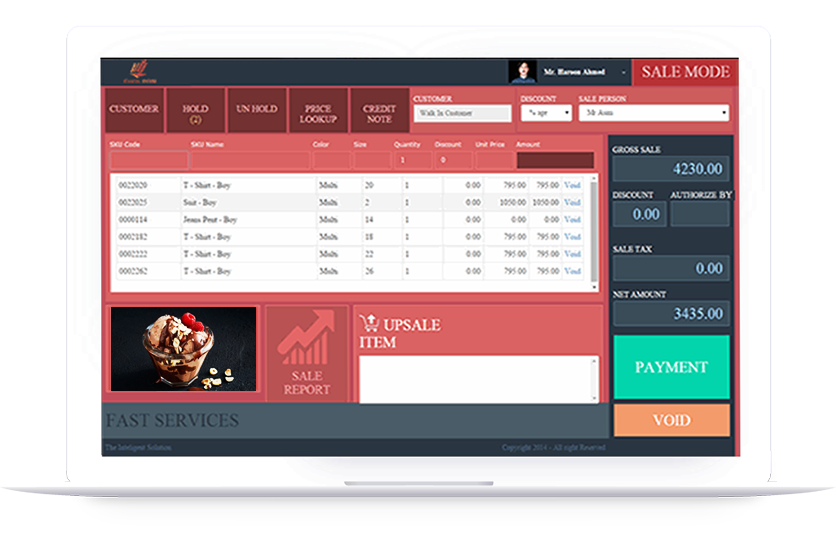The restaurant industry has evolved significantly over the years, and technology has played a crucial role in shaping its landscape. One of the most significant technological advancements in recent times is the adoption of cloud-based Point of Sale (POS) systems. These cloud-based Restaurant POS systems are transforming the way restaurants operate, bringing efficiency, flexibility, and scalability to the forefront. In this article, we will explore why cloud-based POS is the future of restaurant management.
1. Accessibility and Mobility
One of the primary reasons why cloud-based POS is gaining popularity in the restaurant industry is its accessibility and mobility. Traditional POS systems were typically installed on-site and tied to specific hardware, limiting where and how restaurant staff could access them. In contrast, cloud-based POS systems operate entirely in the cloud, allowing owners and employees to access them from anywhere with an internet connection.
This mobility is a game-changer for restaurant management. Owners can monitor sales, inventory, and employee performance in real-time, whether they are at the restaurant, at home, or on the go. Servers can take orders and process payments directly at the table, enhancing the customer experience. The ability to access the POS system remotely increases flexibility and ensures that restaurant management is always in control, even when they are not physically present at the restaurant.
2. Cost-Effectiveness
Cloud-based POS systems offer a cost-effective solution for restaurant owners. Traditional POS systems often required significant upfront investments in hardware and software licenses. In contrast, cloud-based POS systems operate on a subscription model, eliminating the need for substantial upfront costs. This subscription-based pricing structure allows restaurants to spread their expenses over time, making it more accessible to small and independent establishments.
Furthermore, cloud-based POS systems eliminate the need for costly maintenance and upgrades. The provider takes care of software updates and maintenance tasks, reducing the burden on restaurant staff and minimizing downtime. This cost-saving aspect of cloud-based POS systems is particularly appealing to restaurant owners looking to optimize their budgets while still leveraging cutting-edge technology.
3. Scalability
As restaurants grow and evolve, their technology needs change. Cloud-based POS systems are highly scalable, making them an ideal choice for restaurants of all sizes. Whether you operate a small bistro or a large chain of restaurants, a cloud-based POS system can adapt to your needs.
Adding additional terminals or locations is a breeze with cloud-based POS systems. There’s no need for extensive hardware installation or reconfiguration. Restaurant owners can simply add new devices and users to their cloud-based system as their business expands. This scalability ensures that the POS system can grow with the restaurant, making it a sustainable and future-proof investment.
4. Enhanced Data Insights
Data is a valuable asset in the restaurant industry, and cloud-based POS systems excel at collecting and analyzing it. These systems provide comprehensive reports and analytics that can help restaurant owners make informed decisions. From sales trends and customer preferences to inventory management and employee performance, the data generated by cloud-based POS systems can be a goldmine of information.
By harnessing the power of data insights, restaurant management can optimize menu offerings, pricing strategies, and staffing levels. This data-driven approach can lead to increased revenue, improved customer satisfaction, and better overall efficiency. In an increasingly competitive market, having access to actionable data is a significant advantage.
5. Integration Capabilities
The modern restaurant ecosystem involves numerous tools and technologies, from online ordering platforms and reservation systems to loyalty programs and third-party delivery services. Cloud-based POS systems often offer robust integration capabilities, allowing restaurants to streamline their operations by connecting these various tools.
Integration with online ordering platforms, for example, enables seamless order processing and inventory management. Integration with reservation systems ensures that tables are efficiently allocated, reducing wait times for customers. Loyalty program integration helps restaurants retain and reward their regular patrons. These integrations not only enhance the customer experience but also make restaurant management more efficient and less prone to errors.
6. Security and Reliability
Security and reliability are paramount in the restaurant industry, where customer data and financial transactions are at stake. Cloud-based POS systems prioritize security by employing advanced encryption methods and data backup procedures. In many cases, they offer better security measures than traditional on-premises systems, which can be vulnerable to physical theft or damage.
Additionally, cloud-based POS systems are known for their reliability. They are hosted on redundant servers, ensuring minimal downtime even in the event of hardware failures. This reliability ensures that restaurant operations can continue without interruption, providing peace of mind to both owners and customers.
7. Environmental Sustainability
Sustainability is a growing concern in today’s world, and cloud-based POS systems contribute to environmental conservation. Unlike traditional POS systems that require energy-intensive on-site servers, cloud-based systems rely on data centers that can be optimized for energy efficiency. This reduced energy consumption helps restaurants lower their carbon footprint.
Furthermore, cloud-based POS systems reduce the need for paper receipts and invoices. They offer digital alternatives, such as emailed receipts and electronic invoices, which can significantly reduce paper waste. By adopting environmentally friendly practices, restaurants can attract eco-conscious customers and contribute to a greener future.
Conclusion
The restaurant industry is evolving, and cloud-based POS systems are at the forefront of this transformation. Their accessibility, cost-effectiveness, scalability, data insights, integration capabilities, security, and environmental sustainability make them a compelling choice for restaurant management.
As the restaurant landscape continues to change, embracing cloud-based POS technology is not just a choice but a necessity to stay competitive and thrive in the digital age. By doing so, restaurant owners can streamline their operations, enhance the customer experience, and position their establishments for long-term success. Cloud-based POS is not just the future of restaurant management; it is the present and a key driver of innovation in the industry.

